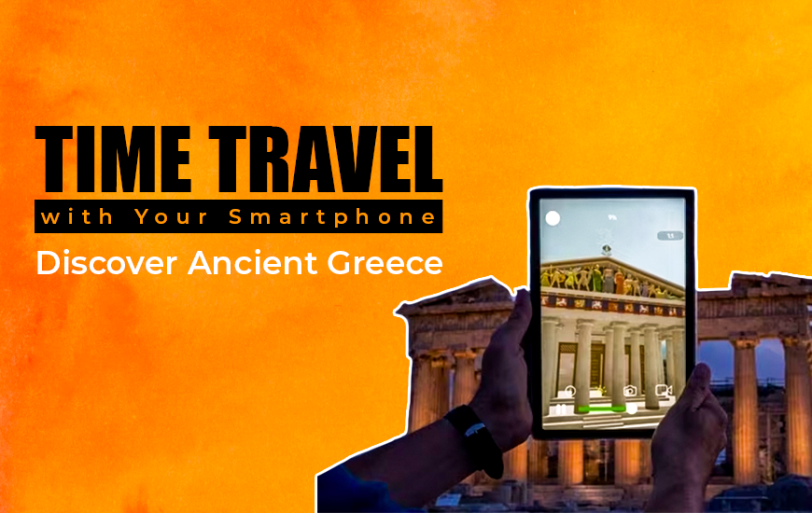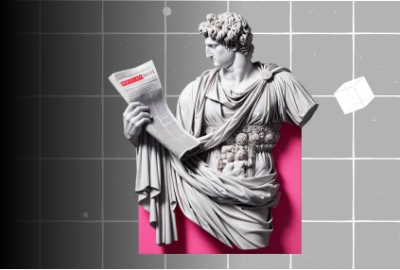This Future Tech Shows Live History Visuals Of Ancient Greece

Date: October 09, 2023
With just a smartphone, an app called Chronos can show how the ancient Greek monuments looked earlier, just by pointing the camera at them.
Greece is soaring back in tourism after COVID-19 led it to a sharp decline in 2020. For the past three years, the country has been developing digital means of making tourism accessible to the global public. In recent innovations, the culture ministry has deployed a smartphone app, Chronos, that gives live visuals of how the ancient monuments used to look during their present times.
This technology has astounded multiple visitors and has paved a new path for the tourism industry using a digital-first approach. The application is built by a Greek Telecom provider company, Cosmote, that aims to develop an Artificial Intelligence free of cost guide for tourists.
The monument of the Acropolis can be seen as it used to look in the ancient period, in high resolution, just by pointing the smartphone camera at it. Users can also pinch and zoom into the details with unmatched clarity as the pictures are renditions integrated with Augmented Reality.
For now, the Greece Ministry of Culture has allowed visitors to point their smartphone cameras using the app at the Parthenon temple and the sculptures housed in London. The monuments and sculptures automatically show the visuals of how the archaeologists believe they appeared 2500 years ago.
Other than the most prominent AR feature, other features are also in place, with many more being built rapidly. Many of the statues in and around the Acropolis were painted in striking colors, which now can be seen through the app. Athena’s sculpture in the main chamber of the Parthenon temple also stood over a shallow pool of water, which can be seen in the app.
“That’s really impressive. The only time I’ve seen that kind of technology before is at the dentist”, said Shriya Parsotam Chitnavis, a tourist who visited Greece from London after watching the ancient visuals of the Acropolis hilltop one afternoon.
The virtual restoration works efficiently and can also be helpful for visitors who cannot bear the pain of trekking to the hilltop of the Acropolis. The government is heavily investing in Artificial Intelligence and Augmented Reality to build a complete digital tour for visitors. This innovation will also help the government promote digital tours across the world. The Greek economy relies dominantly on tourism as it is one of its main attractions. Apart from this, Greece is using AI and digital-first solutions in medical surgery, military training, and specialized machine repair. It is also building AR-powered solutions for retail and live events that big tech companies have laid their eyes on with a bet that this will be the most lucrative future in immersive services.
While most of the COVID-19 period went bland, the Greek economy experienced a 21.9% increase in visitor count, mounting to 16.7 Million Euros in revenues this year. The overall revenue of Greece increased by 20% to 10.3 Billion Euros. Technology will indeed become the major contributor to development, and this is a prime example of the vision.

By Arpit Dubey
Arpit is a dreamer, wanderer, and tech nerd who loves to jot down tech musings and updates. With a knack for crafting compelling narratives, Arpit has a sharp specialization in everything: from Predictive Analytics to Game Development, along with artificial intelligence (AI), Cloud Computing, IoT, and let’s not forget SaaS, healthcare, and more. Arpit crafts content that’s as strategic as it is compelling. With a Logician's mind, he is always chasing sunrises and tech advancements while secretly preparing for the robot uprising.
// Recommended
Pinterest Follows Amazon in Layoffs Trend, Shares Fall by 9%
AI-driven restructuring fuels Pinterest layoffs, mirroring Amazon’s strategy, as investors react sharply and question short-term growth and advertising momentum.

Clawdbot Rebrands to "Moltbot" After Anthropic Trademark Pressure: The Viral AI Agent That’s Selling Mac Minis
Clawdbot is now Moltbot. The open-source AI agent was renamed after Anthropic cited trademark concerns regarding its similarity to their Claude models.

Amazon Bungles 'Project Dawn' Layoff Launch With Premature Internal Email Leak
"Project Dawn" leaks trigger widespread panic as an accidental email leaves thousands of Amazon employees bracing for a corporate cull.

OpenAI Launches Prism, an AI-Native Workspace to Shake Up Scientific Research
Prism transforms the scientific workflow by automating LaTeX, citing literature, and turning raw research into publication-ready papers with GPT-5.2 precision.

Have newsworthy information in tech we can share with our community?







